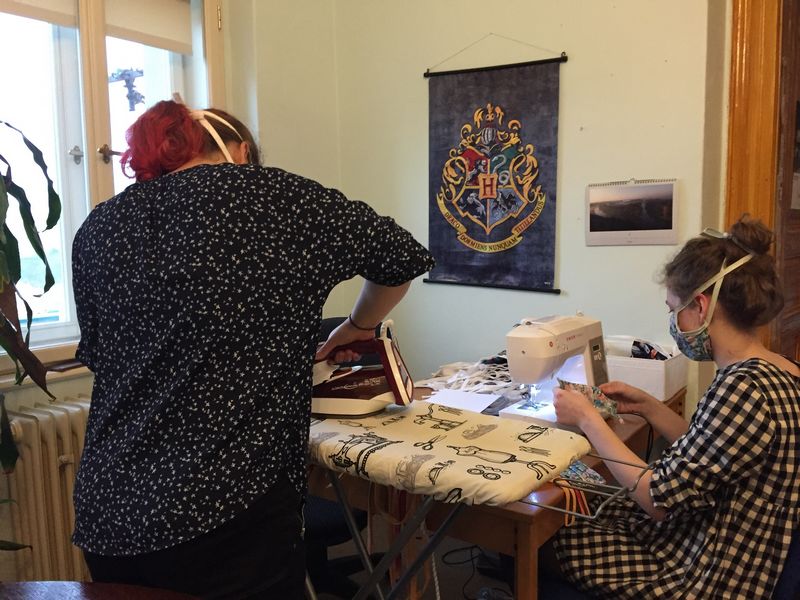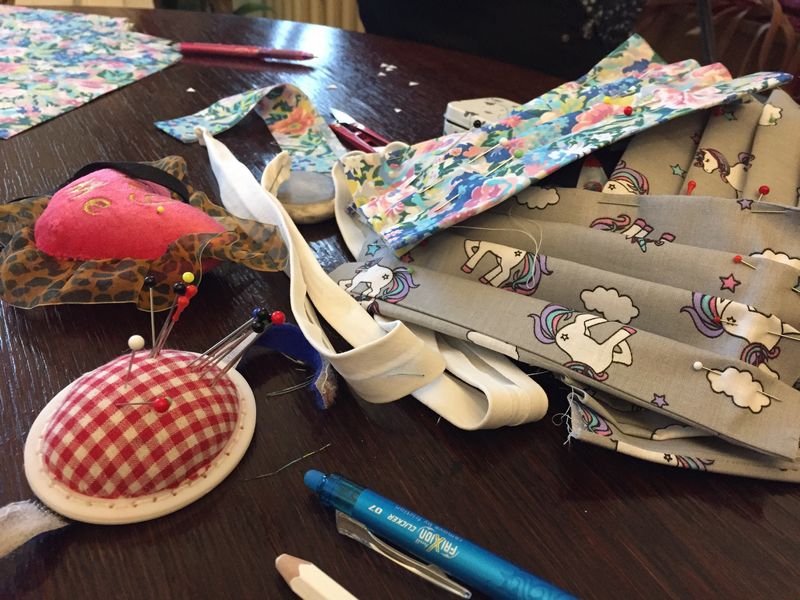Prague, Czech Republic – In an outpouring of solidarity and a wave of selfless acts of generosity that times of crisis such as these ones often prompt, Czechs have massively come to the fore to sew protection masks lacking all over the country.
#SijeCeleCesko #AllCzechRepublicSews
I can’t help chuckling inwardly when I arrive at the house of the Maskovi. What a great name for a family organizing the voluntary production of home-made protection masks! As soon as I enter their apartment, Martina disinfects my hands before letting me join a small group of young women already hard at work. czechs masks solidarity
Wherever I look lie bits and scraps of cloth and fabric, strings and threads, pins and scissors: I find myself in a clandestine sewing workshop in the center of Prague, at the heart of a country that faces dire shortages of masks for both its inhabitants and social workers. To meet the demand, volunteers, most of them women, have taken out their sewing machines and made all the arrangements to coordinate their efforts via social media.
“Absurd”. That’s how Martina describes the situation. But she doesn’t have time to get into a political discussion, too busy sewing, relentlessly, masks that are then distributed to hospitals, nursing homes and other social and health institutions. “I heard that the maternity ward not far from here didn’t have enough masks, and then I saw an online DIY video explaining how to make your own masks”, Martina, an art student, told me.
On social media, she organizes the workload and sets up the schedule with friends and friends of friends. More than a hundred masks have since then been produced and distributed throughout the city. The group of volunteers is also working on an online platform to better coordinate supply and demand.
Killing two birds with one stone
For hours on end, we work non-stop as if in a factory production-line: while some are in charge of cutting mottled cloth donated for the cause, others fold and pin the fabric then assembled by Martina, whose sewing machine works non-stop at full capacity. Rockets, unicorns, Russian dolls, flower motifs… There’s something for everyone’s tastes, and these colourful home-made masks worn by the passers-by in the street may just bring a flicker of joy in the now-deserted and abandoned urban landscape.
Martina and her sewing accomplices adapted the original staple model to make double-layer masks with a front pocket, through which a filter can be slipped through and changed on a regular basis – due to the fact that basic masks do not provide sufficient protection for healthcare workers.

All the while working, we all get acquainted, chatting without ever taking our masks off with musical background, sipping coffee and eating some cake here and there. Who here could have imagined a few months ago being thrown in a situation such as this one, in a country whose population has been left to its own devices and forced to self-organize to sew its own protective masks?
The atmosphere is pleasant, and brings a most welcome and needed moment of relaxation for many of those volunteers who otherwise spend the rest of their days in home-office, alone behind their computers. After working four hours with the pins, my fingers are full of holes, but I nevertheless bring back some leftover fabric to continue working on them with my partner at home. That same evening, she goes out to give two masks to one of our neighbours who lives at the corner of our street.
Solidarity in times of quarantine
Due to precautionary measures, collective work remains an exception, and most volunteers work in alone in their own house. That’s exactly what Kristýna does all day long, in her Prague apartment, sometimes with the help of her family. In the evening, Kristýna, a nursery worker forced to take a leave from work due to the pandemic, distributes what she made throughout that day.
“Actually, masks seemed ridiculous to me at first. But when I heard that a close friend worked in a hospital turned into a centre for infected patients, I naturally became afraid and understood that we couldn’t take this disease lightly”, she told me by text message. “The simplest thing I could do myself was to pick up a needle, a thread and start sewing masks”.
Michaela, who started sewing after noticing the large shortage of masks, tells a similar story. Considering the skyrocketing demand, it took some time for her sewing machine to get delivered, but she nevertheless took the time to prepare the fabric and was able to manufacture masks for her colleagues at the municipal hall, where she works. “At the beginning, it took me hours, I only made four in one day. But now I’m able to do it much more quickly”, she explains.
“I’m happy to see that in times of crisis, people are not quibbling as much as usually, and start to actually work together and help each other out. I’m feeling a real wave of generosity and community from all sides”, she told me by text. Kristýna also highlights this long-lost virtue that we’re seemingly rediscovering: solidarity: “I believe that only our sense of solidarity and humanity can help us overcome this difficult situation”.

Aiding the most vulnerable
Apart from producing the masks, the other priority for volunteers is to deliver first-necessity items to elderly people and other vulnerable people in the country, the main targets and victims of the coronavirus. Throughout the country, shops and supermarkets are open to elderly people only at a specific time, but volunteers are also working to bring them medicine and groceries directly at home, or sometimes to take their dogs out.
In Prague, municipalities also offer their services thanks to the help of a cohort of volunteers, and the city cooperates directly with the food delivery services, although this still hasn’t been replicated nation-wide.
In Mohelnice, a city of 9,000 inhabitants near Olomouc in Moravia, Tadeáš Bača puts up posters on the walls and helps elderly people with a team of other volunteers. “Right now we’re helping nine people, most of them pensioners”. 20-year-old Tadeáš is the country’s youngest municipal councilor and also plays a key role in coordinating and producing protective masks for his constituents.
“The situation is terrible, I could never have imagined it”, he said over the phone. “Far be it from me to glorify the former regime, but at the time, there were masks in every school, whereas now the state only had 10,000 of them before the epidemic!” czechs masks solidarity
He nevertheless noticed that the response of national authorities had progressively improved. Like elsewhere, his city has seen an unprecedented outpouring of solidarity: “Many Czechs are volunteering, and we now have more people helping than people in need of help”. For now, Mohelnice hasn’t been touched by the virus, but Litovel and other neighbouring municipalities have had to be put in total quarantine for some time.
In any case, solidarity seems to have taken precedence over and supplanted both the government’s faux-pas and the damages caused by the coronavirus in the Czech Republic.

Article originally published in French by Le Courrier d’Europe Centrale, a Kafkadesk partner, and written by Adrien Beauduin.
A Prague-based correspondent, Adrien is a Central Europe and former Eastern bloc specialist, who studied political science and European affairs at the School of Slavonic and East European Studies in London, at Charles University in Prague and the College of Europe in Warsaw.

Pingback: Czech nudists reprimanded by police for not wearing face-masks – Kafkadesk
Pingback: Face Masks Exhibition at the Czech National Museum, Prague - Arts Tribune
Pingback: What people got wrong about the COVID-19 pandemic in Central and Eastern Europe
Pingback: What people got wrong about the COVID-19 pandemic in Central and Eastern Europe – Kafkadesk
Pingback: Czech Republic to tighten face-masks rules on September 1 – Kafkadesk
Pingback: Prague National Museum holds special face-mask exhibition – Kafkadesk
Pingback: Czech Republic to set up “face-masks museum” in Prague – Kafkadesk